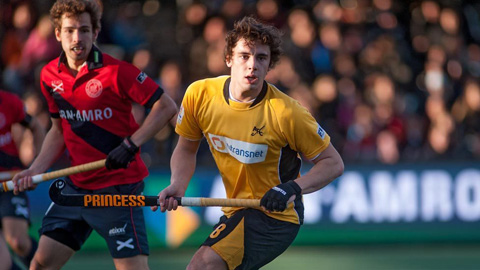European Commission funding for the UAB and Atlètic Terrassa's "STICK" project

19/01/2018
The STICK (Sport and Academic Talent Integration through Exchange Programmes in Hockey) project, funded by the European Commission through its Erasmus+ programme's SPORT action, aims to design a sports and academic exchange programme under the framework of the Erasmus+ programme, in hopes of eliminating the difficulty for elite and high performance athletes to participate in an Erasmus programme without sacrificing their sports career.
The project, proposed by the Atlètic Terrassa Club and the Universitat Autònoma de Barcelona, was selected in the 2017 call of the SPORT Action within the European ERASMUS+ programme, from a total of 370 proposals and with an excellent score (87 out of 100). The total of proposals selected by the European Commission is 160. STICK also aims to give support to the dual career of athletes as well as reduce the loss of talent sports clubs suffer when these students decide to participate in an Erasmus programme. With a total funding of €372,251, the project will be functioning during two years among all of the members of the consortium.
The project will be conducted by a consortium which includes a total of 10 institutions from 5 European countries where field hockey is a prominent sport, with one hockey club and university per country: the Atlètic Terrassa Hockey Club, coordinator and promotor of the project, and the Universitat Autònoma de Barcelona on behalf of Catalonia; Belgium, with the participation of KHC Dragons and the University of Antwerp; the Netherlands, with Rotterdam HC and the Erasmus University Rotterdam; England, with Beeston HC and the Nottingham Trent University; and finally Ireland, with the Pembroke Wanderers and the Dublin City University.
Currently, European university students must develop not only academic knowledge, but also the skills and competences needed to succeed in a highly globalised labour market. Today, language and intercultural skills and competences are basic and they are the reason why the European Commission gives support to mobility programmes which facilitate enrolling in studies abroad, thanks to the famous Erasmus programme. Amateur elite athletes are not immune to this reality. They must dedicate themselves to two careers and perform at maximum levels in both: academically and athletically. If they want to remain at the top level they must work hard at their training and in competitions. At the same time, they must excel academically given that their professional future will not depend on the sports they play, but on their studies and professional aptitudes.
Too often, students are forced to give up the experience of studying abroad, due to their rigorous training programme. Other decide to focus more on their studies and stop training in order to be able to live an international year abroad. Yet others choose to train abroad, but leave their studies aside because there is no university in the vicinity offering an Erasmus programme compatible with their home university. Moreover, many clubs and federations lose talented athletes who compete at high levels.
For the ones responsible for the project, there is a need for universities and clubs to work together to make it possible for elite athletes not to have to choose between an academic career and their athletic training and be able to combine both things. The STICK project, which will last two years, is initially focused on field hockey as a pilot sport, but the final objective of the project is to make this academic-athletic mobility model extensive to all sports. In the long term, the European Commission is expected to implement this specific mobility scheme for elite and high performance athletes into future programmes.